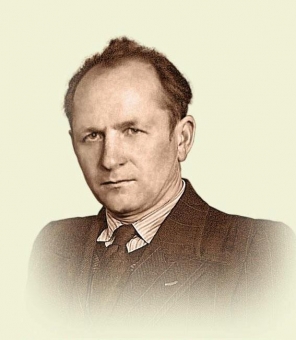Vasyl Grivinsky

Born May 29, 1919 in the village. Dubivtsi of Halych (former Mariampolsk) district of Ivano-Frankivsk region in the family of peasants.
He received his elementary education in Dubivetska and later in Galicia, which he graduated in 1934. He worked in the household assisting his mother, having lost his father early (he died in 1928), who had returned from a World War I cripple while fighting in the Austrian army. He took an active part in the association "Prosvita", created by the rural intelligentsia and youth, joined the youth organization "Plast", was active in the newly created sports society "Sokil". In the village, through joint efforts, the villagers built a reading club, established a cooperative. Soon (1935) he was hired at a mechanic car repair shop in Stanislavov, which belonged to German settlers.
In August 1939, Vasyl entered the Agronomy School-Academy in Lviv (formerly attended by Stepan Bandera), which he had graduated from during the German occupation in 1942. He returns to his native land, where he works as a manager for a film factory in Dubovci, and then in the village of Kozino, which was located across the Dniester River. In these villages at that time there were Magyars in the German troops. In 1941, after the execution of his brothers, he joined the Organization of Ukrainian Nationalists, received the pseudo "Sapper" and worked actively in it.
Very soon, the Organization elects its sub-district leader (Mariampol district, to which 7 villages belonged). With the formation of armed resistance to the occupying power, Vasyl establishes the work of the OUN and the illegal supply of food, ammunition to the rebels, and later the newly formed UPA. In September 1943 his occupation was discovered by the occupiers and decided to execute him, but Eugene, a local resident of the village. The casino releases him from the cellar and he escapes from death.
After that, he goes underground and the OUN sends him first to Volyn in the UPA, and after a while, transfers to the valley school in the valley under the guidance of Paul, after which he is left in the gendarmerie, and a month later appointed to the service security. In October 1944, because of the betrayal of a tactical training instructor on the pseudo "Katso", a major of the Red Army, the management decided to bring the school to other areas in the mountains.
The exit had to go in two stages in two nights. On the first night the junior school was withdrawn, and a day later, on October 12, 1944, at the exit of the second part of the school, the fight was taken at night (after the end of the battle two remained alive).
Basil, covering the departure of hundreds, exploded on a mine, lost consciousness and was captured by the enemy. He was sent to a prison in Pereginsk, and in three days transferred to the Stanislavsky prison.
The Military Tribunal of the NKVD Forces From the Stanislavskaya Region 29. 12. 1944 sentenced to 20 years of hard labor and 5 years of defeat in the rights with confiscation of property.
After returning to Ukraine in 1955, Vasyl worked as an electrician. He married Anna, in 1958, who was married to pseudo - Natalka, who also served in the camps for 11 years and gave birth to two children.
In 1978, Vasyl together with his son Roman rescued the grave of Levko Bachynsky, a prominent politician of the Western Ukrainian People's Republic, who brought to his ears the whole of the Ivano-Frankivsk KGB. In 1996, the grave was again transferred to Memorial Square.
Vasyl Grivinsky died at the age of 89 on March 19, 2008 after a heart attack, buried in a city cemetery in the village. Chukalivka.
He served his sentence in the Gulag camps in Vorkuta, Norilsk and Tayshet.
board_info
Address: Lepkogo st., 46
date: Thursday, 23 May 2019



